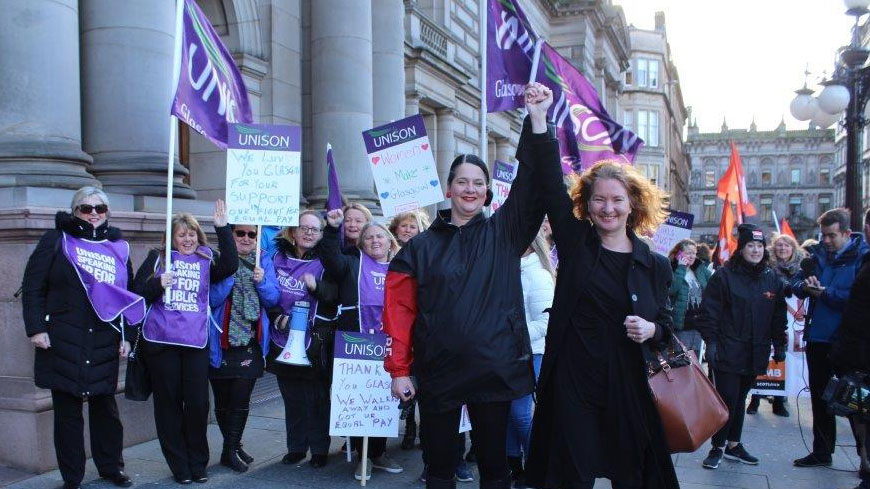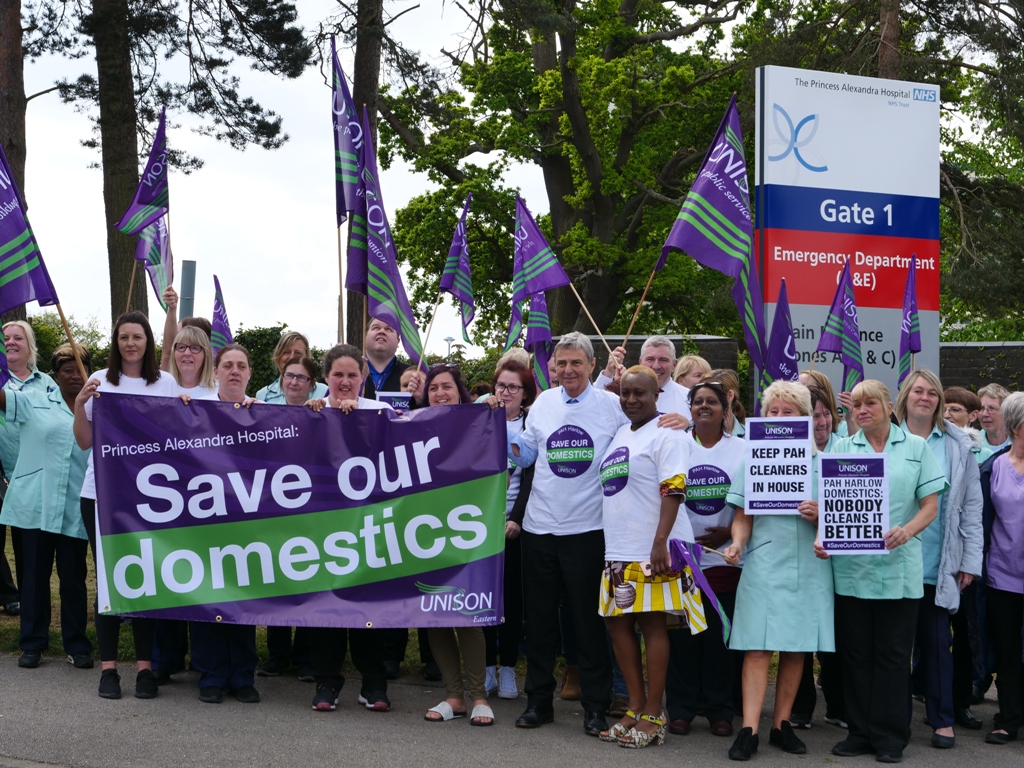January
How better to start a new year than by thinking about the future of the planet? We joined fellow energy unions GMB, Prospect and Unite –representing 200,000 workers in the sector – in calling for a “just transition” to the low-carbon economy needed to deal with climate change.
The unions’ launched a template, which involved four key demands: a balanced low carbon energy mix; investment in skills and infrastructure; protecting and creating high-quality jobs and employment; making sure no community is left behind.
Closer to home – but still thinking of future generations – we kicked off our Year of Young Workers. The move recognised the fact that most young workers are contending with low wages, insecure jobs and the lack of a voice in the workplace. At the same time, we were celebrating the fact that young members are one of UNISON’s fastest growing groups. The union would spend 2019 building on its efforts to reach out to them.
General secretary Dave Prentis used an invitation to Downing Street to warn then prime minister Theresa May that a no-deal Brexit would be a “catastrophe” for the economy, public services and everyone who works in them. He would have to repeat that message many times in the tumultuous months to come.
February
There was good news for members at Solihull sixth form college, thanks to the tenacity of library assistant and branch treasurer Julie Robinson, who won an extra eight days’ pay a year – back-dated for six years – for colleagues on term-time only contracts, who had been historically underpaid.
Julie had discovered that the term-time staff were not receiving payment in respect of public holidays they were entitled to. Those affected included admin staff, careers advisors, science and art technicians and, like herself, Learning Resource Centre staff. She put the case to management until they agreed to remedy their mistake.

Meanwhile, an historic victory was won by women workers in Glasgow (pictured above), who celebrated the positive end of a 12-year fight for equal pay. Following the largest equal pay strike for decades at the end of 2018, the council ratified a £548m settlement.
February featured an unusual warm spell, with the UK’s first recorded winter temperatures of more than 20˚C – so it was good to note that UNISON’s own Croyde Bay holiday resort announced a second year of green initiatives, this time taking major steps to reduce its plastic consumption.
March
The month was dominated by the madness of Brexit as it came to a heated head. As March closed, the UK hadn’t left the EU on time (the first of a number of missed deadlines), but the shenanigans dominated the headlines.
It was up to Dave Prentis to sagely remind everyone that Brexit wasn’t the only issue the country faced.
“The tragedy for those who need a better health service, well-resourced schools and action on crime is that the Prime Minister and her government are the ones failing to act – or worse, they are the root cause of so many of society’s most pressing problems,” he commented.
“Yet the continuing Brexit-based incompetence means no other crisis is receiving the scrutiny it should.”
Throughout the month, UNISON found itself routinely trying to address some of those problems.

Ever leading the way on equal pay, the union launched its Bridge the Gender Pay Gap campaign, which offered an online tool to help activists take practical steps to make their workplace more equal.
Delegates at the union’s community conference spoke, among other things, of the poverty wages and exploitative working practices that have scarred the social care workforce for decades. They vowed to keep pressure on the government to address a multitude of employment issues in the sector.
Elsewhere, the union highlighted two reports: one revealed the full, devastating impact of council cuts during a decade of austerity – not least the vast selling of council land and buildings; the other, the effects of the same period on struggling families, who were losing hundreds of pounds a year as a result of changes to child benefit.
And the month saw a landmark for another issue on which UNISON is deeply committed, when the University of Manchester became the 5,000th living wage employer.
April
The month started with UNISON celebrating 20 years of the national minimum wage – an achievement that UNISON was instrumental in making happen.
Never a union to rest on its laurels, we used the anniversary as a springboard for our #OneWageAnyAge campaign to abolish the discriminatory age bands in the minimum wage – with the aim of moving towards the real living wage for all workers.
This month the union also launched its Local Services Champions campaign (above), to ensure that the efforts of the “the unsung heroes of the public sector” are properly recognised.
UNISON represents 600,000 of them, including social workers, librarians, housing officers, refuse collectors, cleaners, homecare workers, youth workers, environmental health inspectors, and many more working in our communities and providing vital local services.
The union’s health sector held its annual conference in Bournemouth in April, with general secretary Dave Prentis telling delegates that UNISON retained a clear position on privatisation – total opposition, and the expectation that the next Labour government would bring every service back in-house as a day one commitment.

A day later UNISON health members at Liverpool Women’s Hospital claimed victory in their struggle to secure NHS rates of pay (pictured above). The domestics, porters, catering and security staff are all employed by a private contractor, OCS, which had refused to pay them the same rate for the job as staff employed directly by the NHS, who had seen their pay rise under 2018’s nationally agreed deal.
May
With the union’s Go for Growth recruitment and retention campaign just finished, breath was baited. Would the figures add up?
The answer was a resounding yes. The month saw us recruit over 15,000 new members – a 17% increase on May 2018, meaning we grew by just over 3,000 members for the month and by over 5,500 in the year to date. Of those new members, nearly 2,500 were young members.
The month featured a number of campaigning successes: council staff in Sandwell secured a pay raise when the council agreed to regrade them; catering workers at Doncaster and Bassetlaw Teaching Hospitals won the same pay rise from their private employer, Sodexo, as had been agreed for all NHS workers in 2018; and support staff at Bangor University successfully convinced management to halt plans to downgrade their pensions.

And Birmingham care workers (pictured above) won a massive victory, when 82 days of strike action finally persuaded the council to reverse plans to slash hours and pay. The action averted a disastrous outcome that would have seen 200 low-paid care workers, 96% of them women, losing up to £11,000 a year.
Recruitment was boosted by their action – the branch now had 95% density and recruited eight new stewards.
UNISON also welcomed the news that part of the probation service in England and Wales would be returned to public ownership and control. Campaigning continued to bring the entire service in-house.
June
UNISON won a landmark legal case in the Court of Appeal which meant that NHS workers who do regular overtime would now have these hours taken into account when their holiday pay is calculated.
The Court of Appeal judgment found in favour of a paramedic and 12 of his colleagues who work for the East of England Ambulance Service. The ambulance staff argued their holiday pay should better reflect the hours they actually worked, rather than be based solely upon their contracted hours. The ruling could benefit tens of thousands of NHS staff employed under the Agenda for Change payment system.

Cleaners at the Princess Alexandra Hospital in Harlow (above) celebrated a cracking victory when their employer dropped plans to outsource their jobs, after a unified stance by members had brought them to the brink of six days of planned industrial action.
And in a big month for defending the NHS and its workers, the union was among those taking to the streets of London to protest against the state visit of US president, Donald Trump – making it clear that the NHS would not be used as a “bargaining chip” in any post-Brexit trade deal.
Another lively, productive National Delegates Conference ended with the election of UNISON’s new presidential team: president Josie Bird (below), accompanied by Sian Stockholm as senior vice president and James Anthony as junior vice president.

To be continued…
The article A year in UNISON: 2019 reviewed – part one first appeared on the UNISON National site.
from RSSMix.com Mix ID 8239598 https://www.unison.org.uk/news/article/2019/12/year-unison-2019-reviewed-part-one/
via IFTTT
source https://childrensplayareadesigns.tumblr.com/post/189775346687
No comments:
Post a Comment